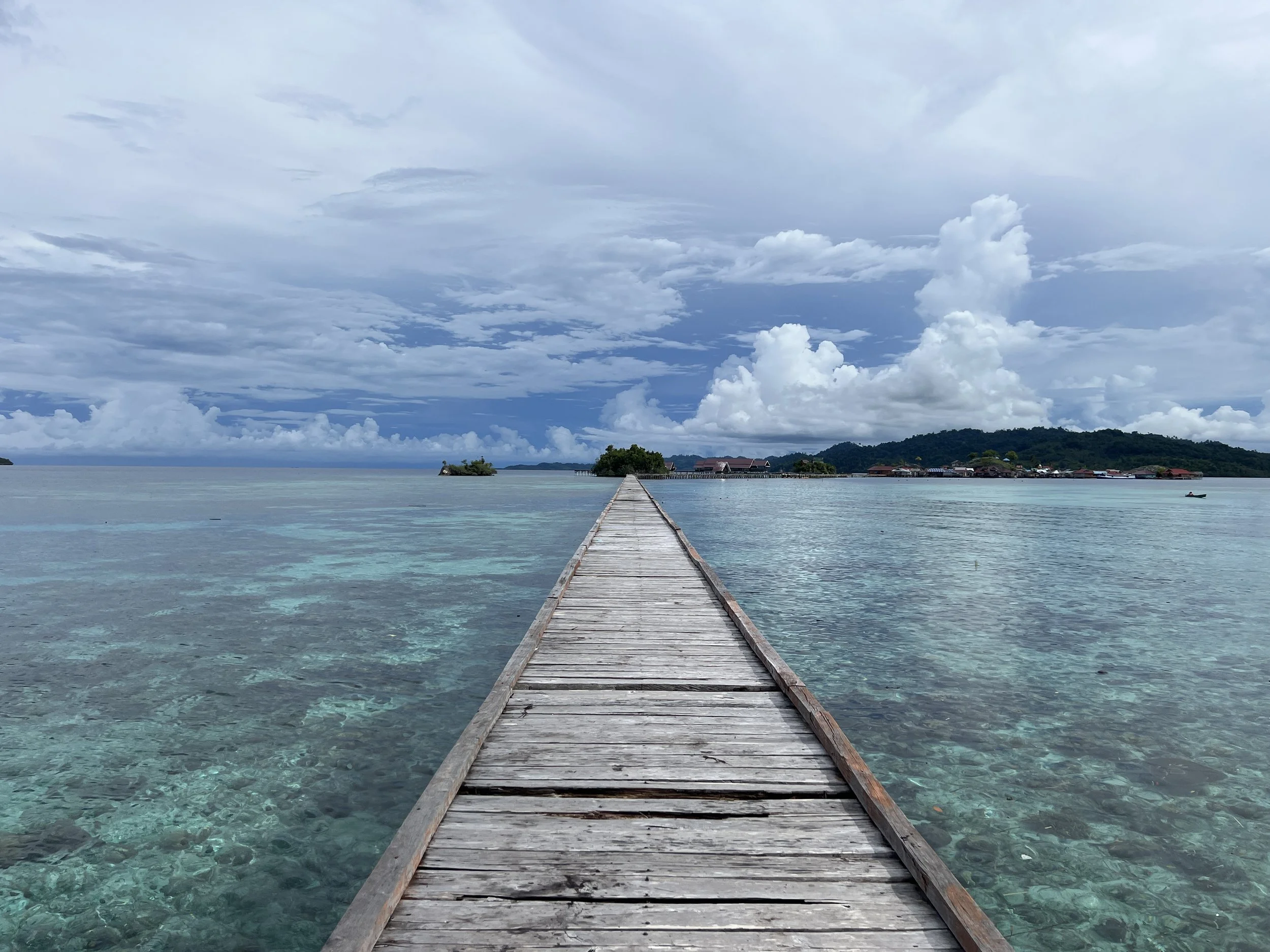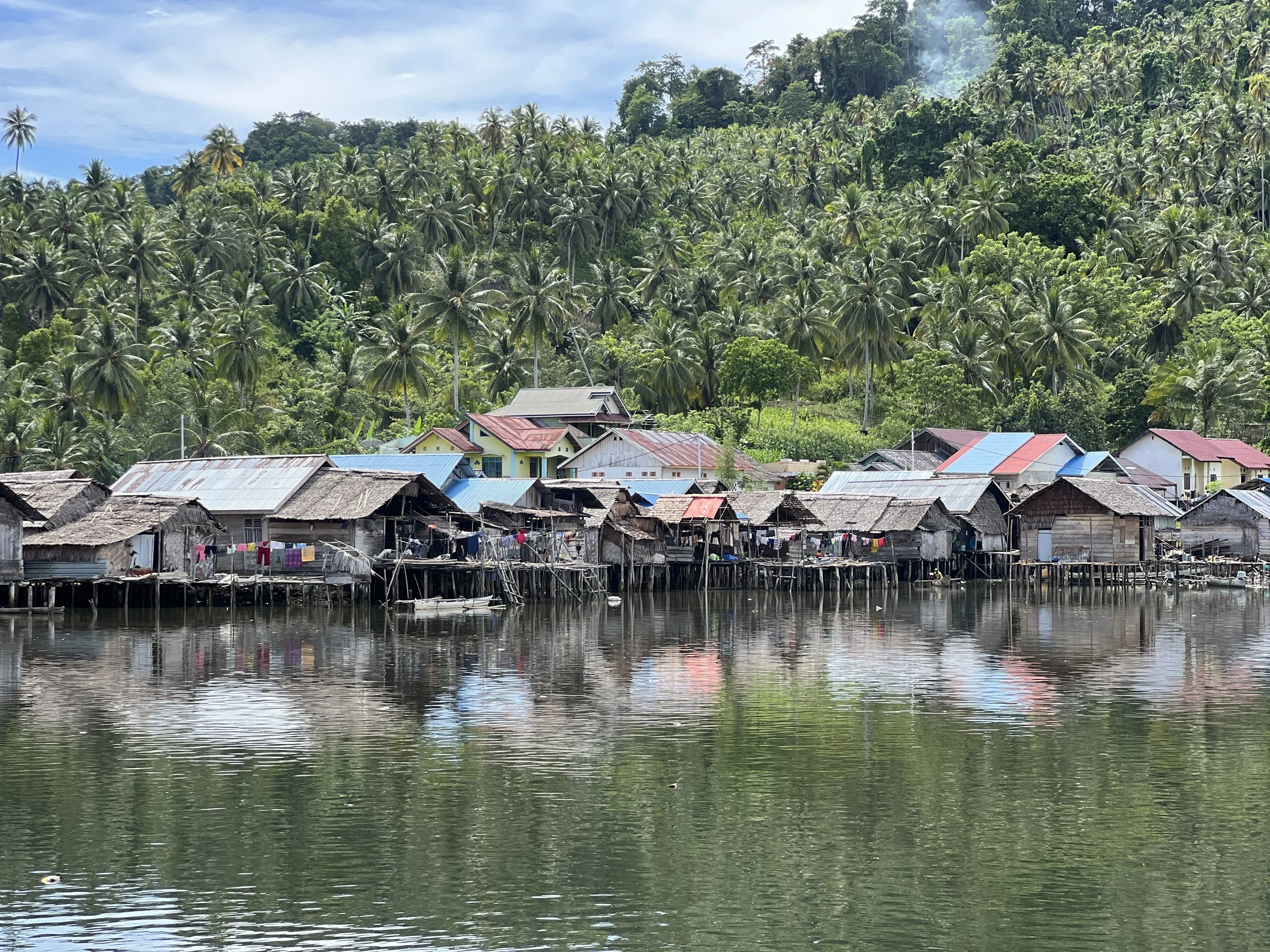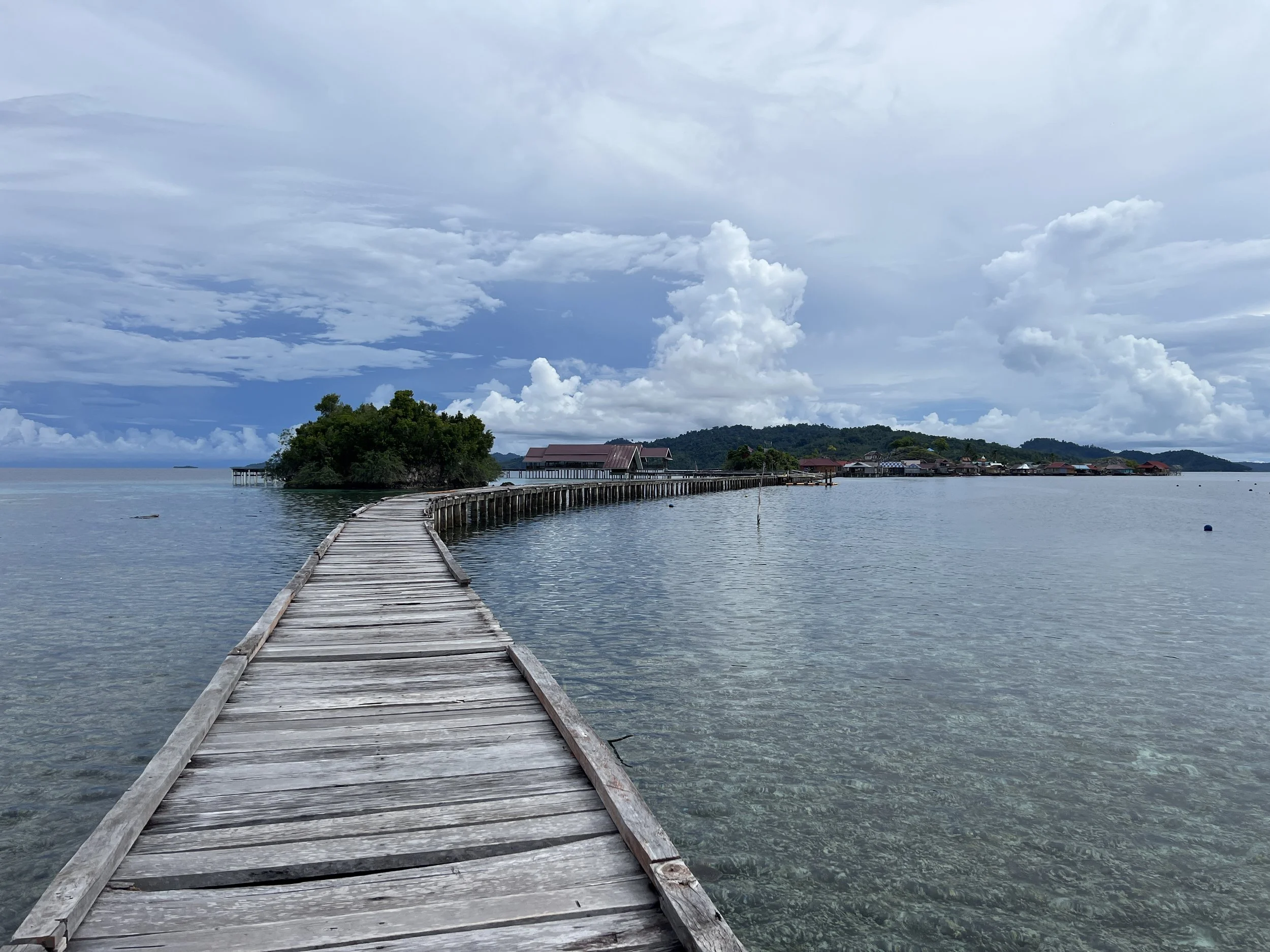SONDER, SONDER, SONDER
We go to the most remote places we can find with the hope of meeting the local, locals. We seek boatless anchorages; yet-to-be hash-tagged landscapes; panoramas and places without large ‘I LOVE’ lettering interrupting the vista. Sometimes we travel days to go far away. We are currently in Sulawesi, where mosques and cell towers compete for both skyline and headspace. People don’t speak much English in this out-of-the-way archipelago and this is where the fun begins.
I start with stickers. I brought stacks of butterfly, sunshine and bee stickers and I hand them out to the kids like candy. It is a nice way to connect and give just the tiniest little something to each of them. They appear in droves, from doorways, trees, canoes, and I Pied Piper my way through the villages. I place stickers on their hands and we try on each other’s language on for size, thank you they say, sama, sama (you’re welcome) I reply. I blast Taylor Swift to see if they recognise it. They don’t, and I love that.
We bash out a smattering of Indonesian, they push play on rote English phrases. Over enthusiastic charades and word mash-ups, we get lost in translating. Oddly, Google Translate inserts ‘bro’ to every Indonesian translation, which adds an excellent Kiwi flavour to it all. High fives, thumbs up, fist bumps suffice. Gangster signs and peace signs, Duck Face and Grace Face adorn every image: there is sass galore. We are not oblivious to the fact that sometimes they are mocking us, tourist, tourist, tourist, yay, yay, yay, one gang of kids chanted. We hold conversations, not speaking many words of each other’s languages, yet we understand each other completely. Well, at least we think we do, and that’s all that matters.
























We have come a long way to meet the seas gypsies of the Togean Islands. Also known as the Bajo, they are indigenous maritime people who have lived on the water for centuries. The ocean is their highway, their pantry and their church. Their clothes are undies, undies, undies, togs, togs, togs, and we have been cruising about their waters, visiting their homes, watching them on the water and soaking in their way of life.
I am Ngāti Wai. Like Bajo, we are people of the water. These quiet people come alongside in their lepa lepa (long boats) powered by a simple direct drive motor - think post hole borer with a propellor - steered with a homemade rudder and tiller ingeniously hand carved with a machete. They offer up ikan, ikan, ikan (meaning, fish). Deep and invisible antecedent threads connect us: in Māori this would be ika, ika, ika.
Bajo people move in and out of the water seamlessly, fishlike and at home swimming, diving and moving through the coral. In an instant, smiling local Mili dived from his lepa lepa, picked up our mooring line, threw it over a buoy, came to the surface with a big smile and yelled “no problem”. “Hati hati, be careful” I holler and we all laugh.
Like many other water nomadic communities in Southeast Asia, the Bajo have been forced to settle on land due to government policies, environmental changes, and economic pressures. So dotted throughout the 56 Togean islands are settlements and houses built on wooden stilts over the water, creating an intriguing water neighbourhood. Communities are connected by wooden planks and boardwalks, embellished with powerlines and street lights. Homes have wood stacks, clothes lines, decks and solar panels. It is all charming if you don’t look below.
Sometimes we stay a day, sometimes we stay a while longer. I like to write about the depth of people, but here I can’t scratch beyond superficial: the conversations are surfacy at best. It is difficult to connect beyond greetings and functional exchanges. Fleeting encounters, flickers of connection and the language limitations leave us feeling sonder.
The Dictionary of Obscure Sorrows, a compendium of new words for emotions is one of my favourite books. I’ve been known to carry it in my handbag. Author John Koenig says its purpose is: to shine a light on the fundamental strangeness of being a human being—all the aches, demons, vibes, joys, and urges that are humming in the background of everyday life.
Sonder is the awareness that everyone has a story.
The French word ‘sonder’ means to plumb the depths (pronounced “sahn-der”). It can be used as a noun or a verb, as you would use the word ‘wonder’.
Koenig explains: When your life moves on to the next scene, theirs flickers in place, wrapped in a cloud of backstory and inside jokes and characters strung together with countless other stories you’ll never be able to see. That you’ll never know exist.
It is not lost on me the immense privilege (understatement) it is to travel this way, no itinerary, no airports, no deadlines. All this from a girl known to plan life in 15 minute increments. I am fortunate by design, and well…. hey…. life has always handed me lemonade. We explore open minded, open hearted and poised open to experience special moments. If someone invites you to get in their dugout canoe, you get in; if there is a jellyfish lake, you swim in it; if someone hands you a baby, you rock it; if someone says do you want to see batman (a bat cave), you grab your torch; and if you have to save a giant sea turtle, well … you save it.
Side story: I found a giant sea turtle fifty metres up the shore, cast upside-down on her shell, a desperate flipper flicking sand caught my eye through the trees. I yelled to the others, lump in my throat, tears already forming, I croaked, “can we save her?”. Honestly it felt hopelessly impossible, she was huge, heavy and she was a long way from the sea. What felt like a crude and graceless attempt to save this creatures life, we inelegantly flipped her, like you would turn over a log. Then we witnessed pure triumph of nature, she orientated herself towards the sea, pinned her ears back, and with what looked like deep instinctual survival spirit, she threw every last ounce of strength and resolve to bolt for the water. We chanted like you would at the finish line of a marathon. Surprisingly agile and strong, she haphazardly made her way, inch by inch toward home. Watching her enter the water felt like coming up for breath after a deep dive. We jumped in the air cheering, wiping tears. Turtle, turtle, turtle, yay, yay, yay!!!
It is Ramadan. The adults are quiet and the children are loud. When we leave, the kids often escort us, parade-like. We are moving on, off to discover someplace new. We are aliens, strangers in a strange land, I feel so grateful. I noted to my friend Karen how indulgent it feels to just travel and write, she replied with her usual gracious insight, “I think we all need an antidote for all the crazy shit we are faced with right now. So spreading some magic moments is such a good idea, we need more people sharing happiness”. And so I write. Taking only photos and leaving only stickers. The children’s bright clothes and bright faces are brilliant against the landscape, their chorus of bye byes echo as we motor away. I wonder what will happen to them, I wonder if they too have wanderlust, I wonder if they are happy, I wonder where they will go. We wave and they wave back and I wonder if they wonder about us too.






